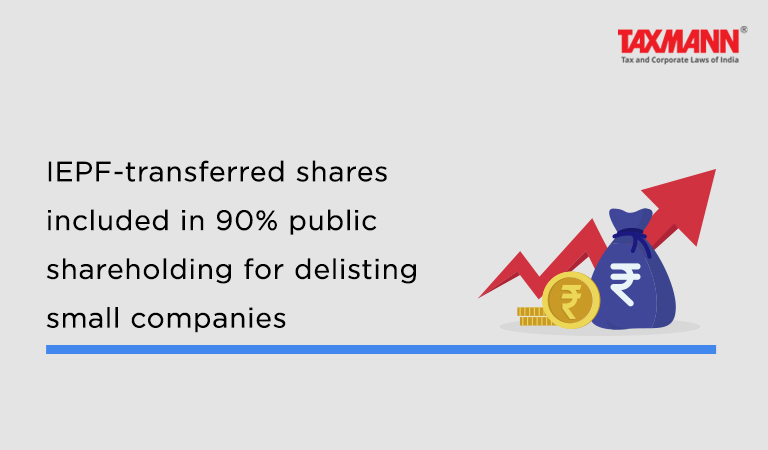IEPF-transferred shares included in 90% public shareholding for delisting small companies
- Blog|News|Company Law|
- 3 Min Read
- By Taxmann
- |
- Last Updated on 16 February, 2023

SEBI Informal Guidance No. SEBI/HO/CFD/PoD2/0W/P/2023/3466/1, Dated 27.01.2023
Query raised by the Applicant Company
The Applicant company sought informal guidance on interpretation of regulation 35(2)(d) under Part A of Chapter VI of the Delisting Regulations, for the purpose of calculating the nature and type of 90% public shareholding.
A confirmation was sought on whether the shares transferred to the Investor Education and Protection Fund’s account in terms of section 124(6) of the Companies Act, 2013 and read with SEBI Circular no. SEBI/HO/MIRSD/RTAMB/CIR/P/2020/236 dated December 02, 2020 shall be excluded for the purpose of calculation of consent of 90% of total public shareholding.
Definition of ‘Public Shareholding’
Regulation 2(1) (t) of the Delisting Regulations defines the term ‘public shareholding’ to have the same meaning as assigned to it under rule 2(e) of the Securities Contracts (Regulation) Rules, 1957 (SCRR), which is reproduced as under:
2 (e) “public shareholding means equity shares of the company held by public including shares underlying the depository receipts if the holder of such depository receipts has the right to issue voting instruction and such depository receipts are listed on an international exchange in accordance with the Depository Receipts Scheme, 2014:
Provided that the equity shares of the company held by the trust set up for implementing employee benefit schemes under the regulations framed by the Securities and Exchange Board of India shall be excluded from public shareholding.
The SEBI’s observation
From the above definition, other than the promoter, the promoter group, subsidiaries and associates of the company, SCRR expressly excludes only equity shares held by a trust set up for implementing employee benefit schemes from calculating the public shareholding.
In the absence of an express exclusion, it may be construed that the shares transferred to the Investor Education and Protection Fund’s (IEPF) account in terms of section 124(6) of the Companies Act, 2013 would be included for the purpose of calculation of consent of 90% of the total public shareholding in compliance with regulation 35(2)(d) under Part A Chapter VI of the Delisting Regulations.
Also, Regulation 21 of the Delisting Regulations governs offer made under Chapter III thereof which deals with the ‘voluntary delisting’ and the counter offer made through reverse book building under regulation 22, where certain categories of shareholdings are expressly excluded (example shares transferred to IEPF) while computing the delisting threshold specified therein.
However, in the present matter which concerns small companies, Chapter VI provides for special provisions for small companies and regulation 35 under the said Chapter pertains to delisting of equity shares of small companies. Under regulation 35 the shares transferred to IEPF may be construed to be included for the purpose of calculation of consent of 90% of total public shareholding.
SEBI’s reply & conclusion
The SEBI, vide its informal guidance, clarified that in case of the delisting by a small company, Shares transferred to IEPF account will be included for calculating 90% of public shareholding. The SEBI further clarified that the Regulation 21 of SEBI (Delisting of Equity Shares) Regulations, 2021 which provides for exclusion of shares transferred to IEPF shall not apply to the applicant company as applicant being a Small Co. The provisions of Regulation 35 (2) (d) of SEBI delisting regulation shall apply.
Click Here To Read The Full Guidelines
Disclaimer: The content/information published on the website is only for general information of the user and shall not be construed as legal advice. While the Taxmann has exercised reasonable efforts to ensure the veracity of information/content published, Taxmann shall be under no liability in any manner whatsoever for incorrect information, if any.

Taxmann Publications has a dedicated in-house Research & Editorial Team. This team consists of a team of Chartered Accountants, Company Secretaries, and Lawyers. This team works under the guidance and supervision of editor-in-chief Mr Rakesh Bhargava.
The Research and Editorial Team is responsible for developing reliable and accurate content for the readers. The team follows the six-sigma approach to achieve the benchmark of zero error in its publications and research platforms. The team ensures that the following publication guidelines are thoroughly followed while developing the content:
- The statutory material is obtained only from the authorized and reliable sources
- All the latest developments in the judicial and legislative fields are covered
- Prepare the analytical write-ups on current, controversial, and important issues to help the readers to understand the concept and its implications
- Every content published by Taxmann is complete, accurate and lucid
- All evidence-based statements are supported with proper reference to Section, Circular No., Notification No. or citations
- The golden rules of grammar, style and consistency are thoroughly followed
- Font and size that’s easy to read and remain consistent across all imprint and digital publications are applied



 CA | CS | CMA
CA | CS | CMA
